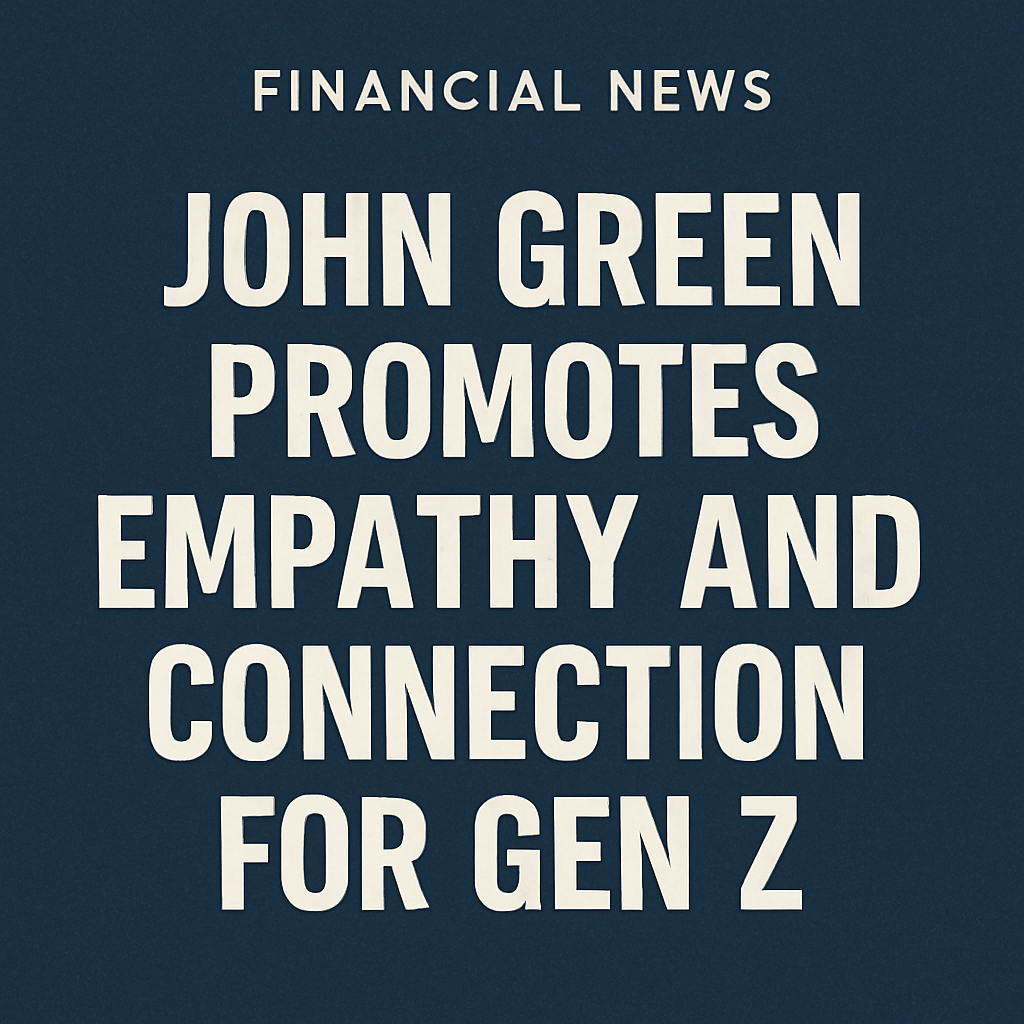John Green Promotes Empathy and Connection for Gen Z

John Green is widely regarded for his emotionally resonant young adult novels. His acclaimed work, The Fault in Our Stars, explores the poignant relationship between two teenagers dealing with chronic illnesses, reflecting on themes of love, loss, and the indomitable human spirit. However, Green’s contributions extend beyond literature; he has become a cultural touchstone, offering insights across multiple domains, including history, philosophy, science, and various aspects of contemporary life through his robust social media presence, boasting over two million followers.
Challenges Facing Today’s Youth
In a recent conversation with Fortune, Green expressed his profound concern regarding the loneliness epidemic affecting young people today. He remarked, “I worry a lot that young people are affected by the terrible disease of loneliness at a scale that we haven’t seen before.” This sentiment resonates deeply in the current climate, marked by the ubiquity of digital communication and social media, which appear to enhance feelings of isolation rather than foster genuine connections.
The negative impacts of social media on mental health are increasingly documented. According to a study published in the Journal of Adolescence, approximately 25% of individuals aged 15 to 18 reported experiencing significant loneliness—a statistic that may be attributed to the ongoing pressures of digital engagement and social comparison. This demographic, often referred to as the “anxious generation” by social psychologist Jonathan Haidt, faces a landscape rife with uncertainty due to economic instability, evolving job markets, and the rapid advancement of artificial intelligence.
The Role of Literature in Developing Empathy
Green posits that reading can act as a powerful tool for personal growth and empathy development, stating, “I think they should be reading more books.” While acknowledging his bias, given his profession as an author, he emphasizes the significance of literature in bridging emotional gaps among individuals. He asserts that novels can serve as portals to understanding different perspectives, allowing readers to inhabit the lives of characters beyond their immediate social circles.
“My case for books is that they shrink the empathy gap,” Green explains. “When I read Catcher in the Rye, Holden Caulfield isn’t my friend or my spouse or my anything, but he is as close as I can come to being someone else.” Research supports this assertion; a study from the University of California found that engaging deeply with fictional narratives enhances readers’ ability to empathize with others, improving social cognition.
The World Happiness Report and Social Connections
The latest annual World Happiness Report highlights critical findings regarding happiness and social connectivity, illustrating a significant decline in the U.S.’s ranking, which has dropped out of the top 20 nations. This downturn is largely attributed to discontent among younger Americans, driven by social isolation and deteriorating mental health outcomes.
One of the key indicators of happiness identified in the report is the belief in the fundamental goodness of others—an ideal that can be jeopardized by a lack of meaningful social connections. Green’s approach to bridging the empathy gap could catalyze efforts to encourage young people to reach out and connect, transcending the confines of solitary reading.
Strategies for Mitigating Loneliness
To combat the pervasive loneliness highlighted by Green, it is essential to encourage young individuals to engage in community activities, volunteering, and dialogue that extends beyond anecdotal interactions. Experts suggest that participation in group activities can foster a sense of belonging and improve emotional well-being. This notion aligns with the findings of a 2022 report from the American Psychological Association, which indicates that individuals with robust social networks experience better mental health outcomes and higher life satisfaction.
Green further elaborates on this sentiment: “Through the process of imagining with clarity and sophistication what it’s like to be someone else, we both learn what it’s like to be ourselves and also learn what it’s like to be one of the 8 billion other people on this planet.” This perspective underlines the enduring relevance of literature in a technology-driven age, where the values of empathy and understanding could significantly ameliorate the current trajectory of mental health challenges among young adults.
Conclusion: A Call to Action
In conclusion, John Green’s insights serve as a compelling reminder of the importance of fostering empathy in an increasingly isolated world. As technology continues to shape interactions, his call for more reading and connecting underscores the need for personal and collective efforts to bridge the emotional divides that have emerged, particularly among the youth. By engaging with diverse narratives, young people can cultivate a deeper sense of empathy, ultimately contributing to a healthier society.
For Your Consideration:
If you are looking to improve your well-being and cultivate deeper connections, consider subscribing to The Well Adjusted newsletter for weekly strategies on enhancing your personal and professional life.
Written by: Alexa Mikhail
Senior Reporter, Fortune Well
Expertise in health and wellness, aging, and mental health.
Source: fortune